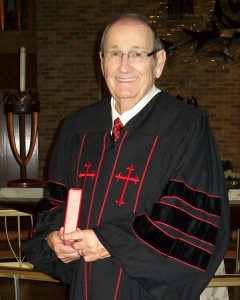
When I was pastor of a certain church, a family had an outstanding dog named “Spiff”. He was known throughout the community as very talented and well-trained. Spiff would sit on his hind legs on the stool and pound the piano keys with his paws, howling as loud and as “off key” as he could. It was somewhat excruciating, to say the least. He was well conditioned, and he always got treats when he did it. I would have happily given him more treats not to do it.
Scripture tells us that human beings are different. We go far beyond conditioning. We are not like Pavlov’s dogs at all. The Psalmist says, “We are created a little lower than the angels, and given dominion over the works of God’s Hands.” Some people rise to unbelievable heights in art, music, math, etc. And just think of the possibilities of the future, with flying cars and other advances in technology. Many people are dedicated to the idea of making this planet a better and safer place in which to live and strive.
If you have ever seen the Sistine Chapel’s ceiling in Rome by Michelangelo, you know it’s truly a masterpiece. Or, if you have listened to Pavarotti, or read about Albert Schweitzer or Steve Jobs, you come away with an exalted view of human achievement. The “higher self” gives us hope for the future.
But, lo and behold, there is a “lower self”. That’s where our “favorite sins” are stored. And, that’s where we keep certain personality traits hidden from public view. It’s a dreary place, and sometimes it raises its ugly head, trying to take over the whole person. Sometimes, it succeeds. But, we tend to forget that God is there, too, ready to help us out of the mire.
An American humorist was once asked what he loved most in life. This was his reply: “I love women best, whiskey next, my neighbor next and God hardly at all.” Is it a sin to be drawn to the things of this earth, such as other people, pleasure, material belongings, money, intimacy, comfort and so forth? I don’t think so; it all depends upon our motive and the way we relate to these matters. Do these things have an appeal to us more than God and religious faith? Yes, for the most part; unfortunately, we are told that not putting God first in our feelings is a big “no-no”. This can lead to a guilt trip, and we ask, “What is wrong with me?”
I believe this is the wrong approach. We don’t have to separate God from everyday life. We can find a deeper spiritual meaning in other people, beautiful things, intimacy, pleasure, money, etc. God is a part of our everyday life, small things included. I don’t even know what “putting God first” means, unless it is related to the things of this earth. Loving my family and helping my neighbor is somehow tied up in our relationship with the Creator God.
Fr. Ron Rolheiser says we need to understand human instinct and human desire at a deeper level. We might begin with St. Augustine’s memorable phrase: “You have made us for yourself, Lord, and our hearts are restless until they rest in you.” When we analyze our natural instincts and natural desires more deeply, we see that all of these are drawing us, persistently and unceasingly, towards God. I don’t understand why we try to separate God from the secular. “In Him, we live and move and have our being.”
As I have mentioned before, God is in our hells as we as our heavens. God helps us, if we let Him, find our way out of the basement of life, where we can listen to the higher self, and rise to better life. And when we do listen to the Higher Self, we begin to take full responsibility for our behavior. We begin to see that life has a better way than we have experienced, and we begin to move toward a greater fulfillment. We don’t have to settle for “basement” living. Everyone can make some improvement.
When I was in my late teens, I renounced religious faith. I went through a brief period of confusion and doubting, and the only thing that seemed real was in the realm of science. But as I became older, and life began to throw me curve balls, I could see that I needed a deeper faith that I had lacked before. Life caves in for all of us sooner or later, and we don’t turn to science for help. “Our help comes from the Lord, who made heaven and earth” (Psalm 121).
So God is not calling us to be “religious”, whatever that means. God is calling us to live the abundant life, to help each other during tough times, to enjoy the gift of our days and nights, and to let the “higher self” lead us throughout our earthly journey where we can love and laugh and forgive and enjoy the ride. Amen.









